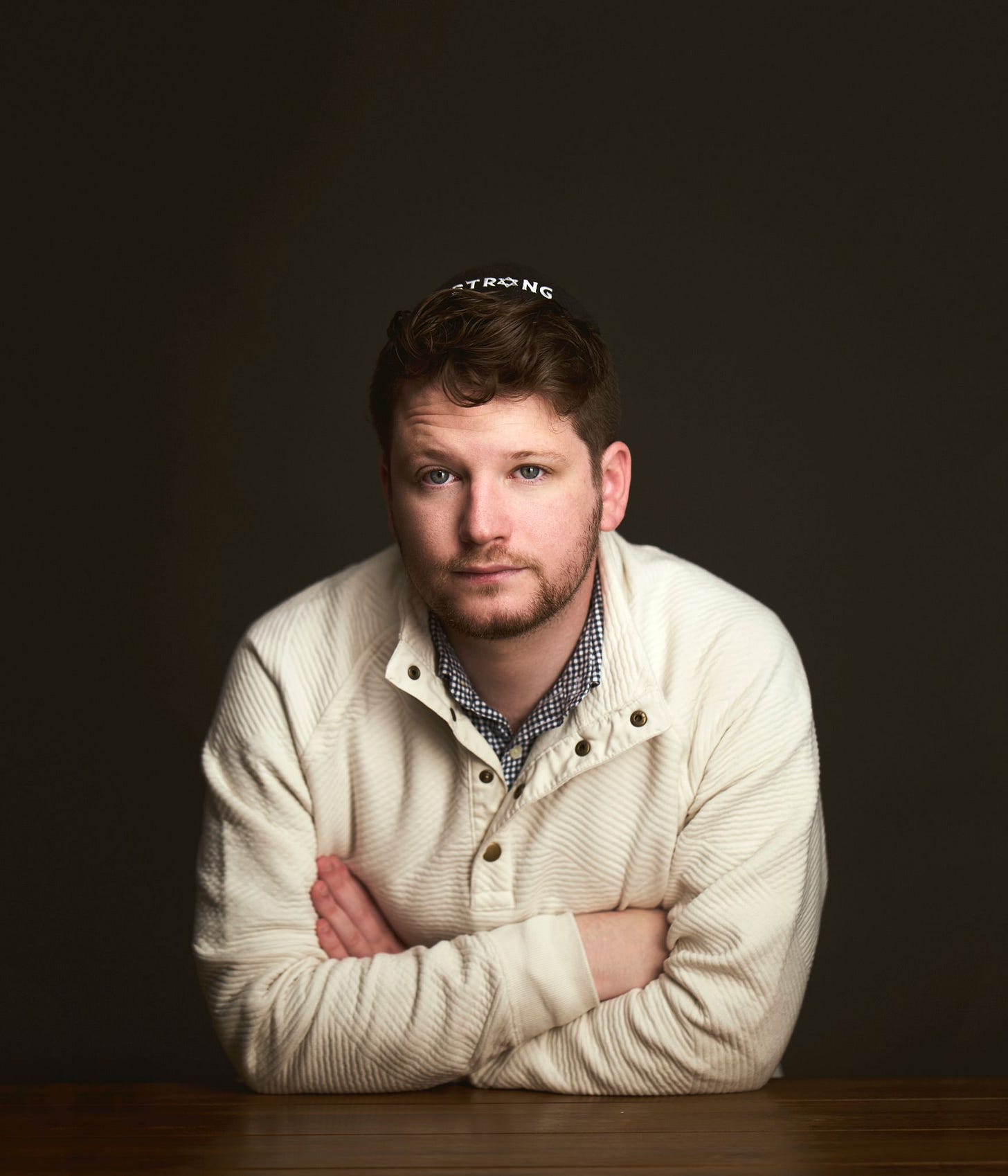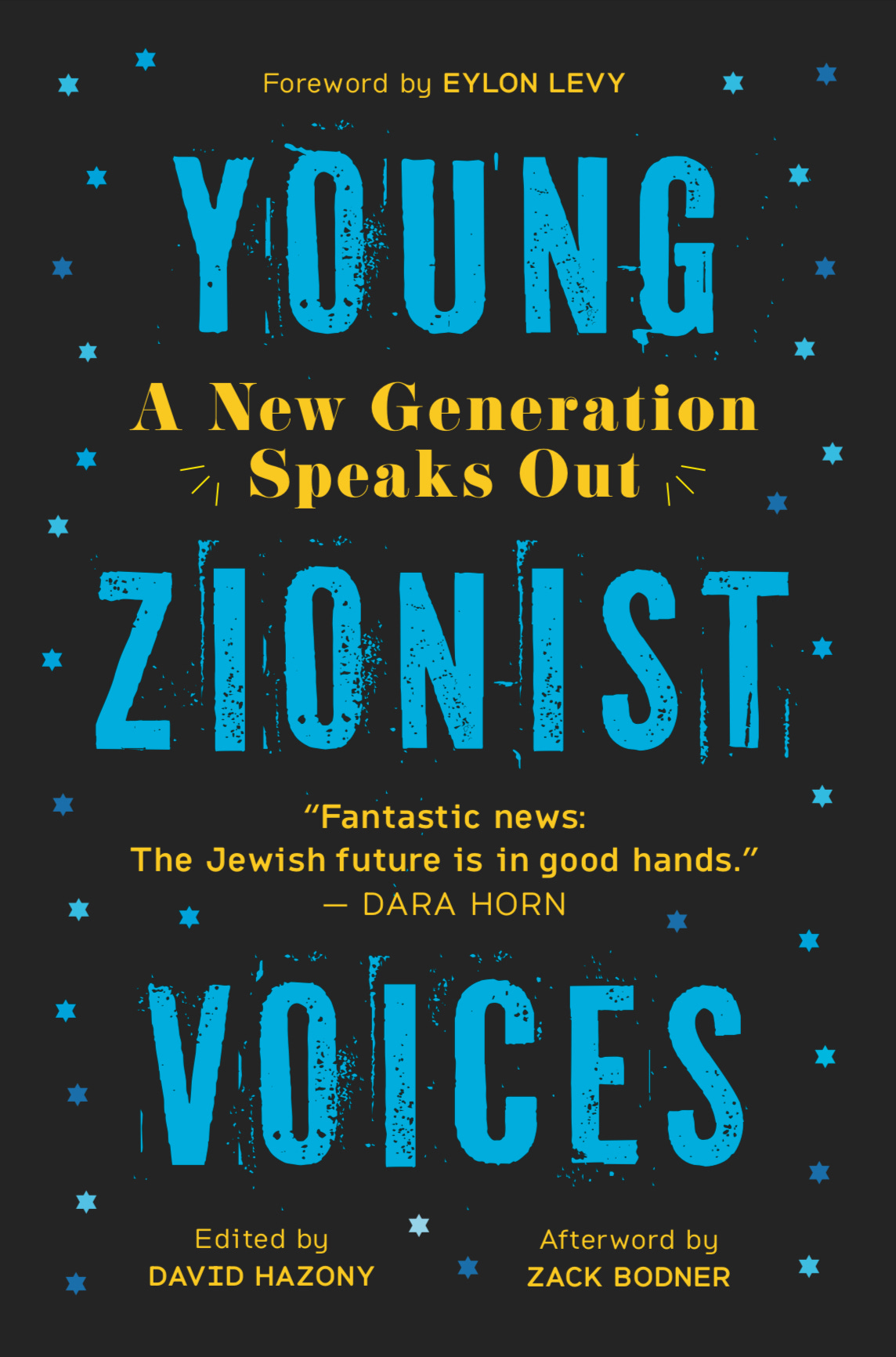Shabbos Kestenbaum: A New Golden Age of American Jewry?
From 'Young Zionist Voices': How the Fight against Antisemitism Will Rejuvenate Our Community
David H.—Proud to share this essay by Shabbos Kestenbaum from Young Zionist Voices. Shabbos has been one of the most prominent voices against campus antisemitism after 10/7. Here he asks what it all means for the future of American Jews—and offers a surprisingly optimistic answer.
Global Digital Launch Event: On January 28, Shabbos will be joining me, along with other Young Zionist Voices contributors Adela Cojab, Alissa Bernstein, Shanie Reichman, and Oz Bin Nun, as well as Z3 Project director Rabbi Amitai Fraiman for a moving online conversation about 10/7 and the Jewish future. Click here for info and to sign up!
Shabbos Kestenbaum is a student activist and the lead plaintiff against Harvard University, alleging pervasive and systemic antisemitism. He is a regular contributor on national media, has testified in front of the United States Congress multiple times, and lectures internationally on Jewish communal issues.
The following is an exclusive reprint from the anthology Young Zionist Voices: A New Generation Speaks Out, edited by David Hazony. Copyright © 2024 Wicked Son. Reprinted with permission.
A New Golden Age of American Jewry?
On the unintended consequences of the antisemitic tsunami.
Shabbos Kestenbaum
When Rabbi Yosef Yitzchak Schneerson, the sixth Lubavitcher Rebbe, fled Nazi persecution and arrived in the United States, he was warned of the spiritual wasteland that engulfed Western civilization. America, he was told, would be unlike the shtetls of yesteryear, intolerant of the flourishing of traditional Jewish life.
“America iz nisht andersh,” he replied. America is no different. Judaism could be sustained there.
Whether he knew it or not, Schneerson’s prophetic insistence was rooted in historical precedent. In his 1790 letter to the Newport, Rhode Island Jewish community—numbering roughly twenty-five families, then the largest in the new United States—President George Washington promised that things would be different. The newborn United States would give “to bigotry no sanction, to persecution no assistance.”
Indeed, for the next two centuries, American Jewry set out to prove Washington right. By building institutions of Jewish life from the shores of New York to the plains of Texas, participating in all avenues of societal life such as politics and entertainment, and contributing thousands of lives to defend it, America was, by all quantitative metrics, a vehicle that enabled the flourishing of Jewish life.
My story of American antisemitism, therefore, is as deeply painful as it is personal.
As my last name Kestenbaum suggests, my family’s origins are traced to Germany. My great-great-grandfather, Rabbi Yosef Breuer, was the leading German Orthodox rabbi and a respected figure within German society. Rabbi Breuer’s youngest daughter, my great-great aunt, vividly recalls praying from the Book of Psalms while the Nazi Gestapo arrested her father and their historic Breuer Synagogue in Frankfurt completely burned to the ground, all on the night of Kristallnacht in November 1938.
But Kristallnacht did not begin with book burnings or broken windows. It did not begin with destroyed synagogues or expulsions. Kristallnacht began with a pernicious ideology that swept across German society.
Kristallnacht began with the acceptance, normalization, and celebration, of Jew-hatred.
***
The treatment of Jewish Americans on college campuses across this country is nothing short of a national emergency. It is blatantly antisemitic, it is frighteningly discriminatory, and yes, it is how a Kristallnacht begins.
As a Jewish student at Harvard University, I say these words from two years of personal experiences with a racial ideology championed by Harvard, that views Jews as an annoyance at best, with pervasive bigotry at worst, and overall suffers from a stunning deficiency of moral clarity.
In my time at Harvard, swastikas were drawn in undergraduate dorms, a Jewish student was spat on, an Israeli student was asked to leave class because her nationality made classmates “uncomfortable,” another Israeli was assaulted at the business school, a staff member taunted me with a machete and challenged me to debate the Jewish involvement in the 9/11 terrorist attacks, our hostage posters were defaced almost daily, and professors published antisemitic cartoons without facing discipline. Harvard students illegally set up encampments all over campus, demanded Harvard divest all moneys from the Jewish state, cheered thunderously when they replaced the American flag overlooking Harvard with that of Palestine, screamed about globalizing the Intifada, drew pictures of Harvard’s Jewish president with horns and a tail, screamed at all hours of the day that “Palestine will be Arab,” established their own rule of law on campus, and followed us Jews on our way to class—all while Harvard either refused to acknowledge these incidents publicly, failed to address them for months, or did not discipline the perpetrators.
While many of us tried for years to reform Harvard internally, our efforts all proved futile. Harvard stubbornly insisted that everything was fine; they were both unable and unwilling to confront the problem.
While we are not facing a Kristallnacht yet, the hour is close to midnight. These unchecked acts of antisemitism—and more so, the normalization of antisemitism—are deeply concerning and dangerous. Indeed, the deteriorating situation at Harvard and across the country caused The Atlantic to feature a crucial question prominently on their front cover: “Is the Golden Age of American Jewry Ending?”
My answer is simple: not without a fight.
***
In January 2024, I had the privilege of filing a historic lawsuit in federal court against Harvard University, alleging a culture of pervasive, systemic, and ingrained antisemitism.
While the choice to resort to such a drastic and public move was difficult, the lawsuit is much bigger than Harvard. It signals that Jewry is willing to defend itself. Thus, I remain proud of our fight, a fight that allows us to express our values openly.
These values have been instilled from the very community and family I grew up in. My mother would often play the great Israeli singer Naomi Shemer in the car; I even remember the day Zionist icon Arik Einstein died. With five siblings currently living in Israel, including two who have served in the Israel Defense Forces, Zionism has been an ingrained aspect of my religious identity. The inherent spiritual attachment to my ancestral homeland spurred me to engage with the Land of Israel itself, including studying in Jerusalem for two years.
To see this critical aspect of my religious expression denigrated in such hostile, vicious ways, at a supposed bastion of intellectual vitality and academic rigor, was deeply distressing at best, and illegal at worst. The lawsuit not only holds universities accountable for their horrific treatment of their Jewish students, but also draws an inherent connection between Zionism and Judaism.
In it, I detail decades of normalized antisemitism, both subliminal and explicit at one of America’s most important institutions.
Fortunately, I wasn’t alone in fighting back.
***
Since October 7, a monumental shift in the story of American Jewry has taken place. More than 150 Jewish students from across the United States have filed similar lawsuits against their universities which detail damning reports of unvarnished, naked Jew-hatred.
These lawsuits, marking a watershed moment in American Jewish history, represent much more than the claims we argue in court. For the first time, Jewish students are unabashedly stating their values under oath and holding their institutions accountable.
We will force our universities to recognize the fundamental truth—that they have allowed their libraries and study halls, classrooms and quads, to be infected by anti-Zionist poison that places the Jew as settler colonial and Israel as an outpost of imperialism. The truth, however, is simple to us students: “Zionism” is not a dirty word. The State of Israel is a beacon of democracy in an unstable region. The Jewish people are not expendable.
With these avalanches of legal filings, there is much to be proud of. In the last year, countless young Jews have taken up the fight for Zionism and the Jewish people. They are testifying eloquently in the United States Congress, they are speaking powerfully to the national media, and their bravery is inspiring millions across the world to see that od lo avda tikvatenu, our hope is not yet lost.
Ultimately, while October 7 unleashed unparalleled antisemitism in the United States, it has awakened a new spirit within young, Jewish Americans. This next generation is full of impassioned Zionists who recognize Israel’s promise and the necessity of keeping it strong. I can confidently assure those who are worried about college encampments and hostility towards Israel, those who are worried that the Golden Age is ending, and those worried that support for Zionism and her ideals is eroding—to merely look at the Jewish students speaking out. The future is in good hands.
We are proud Zionists, proud Jews, and proud Americans.
We are no longer afraid to fight for the Jewish State, its people, and its ideals, be it in the classrooms, on the quad, or in the courtroom.
Why? Because America iz nisht andersh.
The Golden Age of American Jewry is not ending, it’s simply evolving into a new phase—one in which young Jewish Americans will not simply be responding to the current reality, but creating a new future, filled with determined and passionate American Zionists.



Were there legal proceedings fighting back against antisemitism in other times and places? (How did they work, or not work?)
This kid is fearless. He gives me hope for the next generation of Jewish leaders.